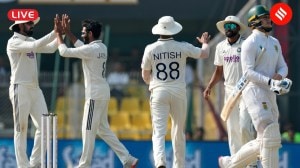Retail investors must be diversified
A chartered accountant,Vikram Kotak took over as chief investment officer of Birla Sun Life Insurance in 2007.
A chartered accountant,Vikram Kotak took over as chief investment officer of Birla Sun Life Insurance in 2007. He is a member of the working group committee on investments formed by Irda and also served as a member for debt market committee of BSE. In an interview with FE’s Saikat Neogi,he underlines that India’s economic growth is led by domestic consumption which bodes well for retail investors. Excerpts:
How do you see the domestic growth story panning out. Which sectors in the country will gain momentum?
With the domestic demand and investment activities likely to be on a sustainable growth path,India is well poised to return to its 8-9% growth trajectory in the medium-term. In my view,sectors with strong fundamentals,visibility of earnings,improving profitability and reasonable valuations should gain momentum. Banking sector is likely to do well with pick-up in credit growth,reduced asset quality risk and environment of neutral interest rates with a tightening bias. Another sector that I am bullish on is Capital Goods and Engineering on the back of strong order backlog and revival in private capex. Pharma sector also looks promising at market dips due to consistent growth visibility but are trading at relatively premium valuations.
What is your view on FII investments in India viz-a-viz other emerging markets?
India is the second fastest growing economy globally and its medium-term growth trajectory remains promising amid a still gloomy world outlook,making it a very attractive investment destination for global investors. At a time when global markets are questioning the sustainability of huge government debts in a number of economies,the government has rightly taken measures to address the fiscal deficit concern. On top of it,the economy is treading on the path of progressive reforms and both institutional and retail investors stand to gain tremendously from this. Within EMs,unlike countries like China and Korea which had adopted the export-driven growth path,India remained internally focused with economic growth led by domestic consumption. While Indian equities have been range-bound in 2010 so far,they have outperformed peer group markets in relative terms and the current global environment suggests that relative out-performance may continue as India stands to benefit from the ensuing global deflationary shock as it will push down global commodity prices.
As the markets are showing high volatility,what are the other avenues of investment for retail investors?
Irrespective of the market scenario,retail investors should invest in line with ones investment objective,risk appetite and investment horizon and be adequately diversified at all times. By diversifying,they will not have to rely on the success of just one investment and will be able to confidently ride the markets ups and downs. It is equally important to follow a disciplined approach towards investments and avoid timing the market. They should judiciously allocate their financial assets between high-risk-high-return assets like equities,fixed return yielding assets & Gold.
How do you see retail investors reacting to the gyrations of the markets?
The retail investors,although cautious about directly venturing into the equity markets,are smartly investing indirectly through the insurance and mutual funds route. Unlike the period of Lehman bankruptcy and credit crisis,equity markets have not seen redemption pressures with the breakout of euro zone debt trouble. In my opinion,the under-investment by Indian households in equities,younger population,increasing awareness and visibility of Indias growth prospects and rising wealth effect with recovery of asset prices and economy are and will continue to encourage equity investments. It is important to look at equity as a long-term investment avenue and not get swayed by short-term volatilities and market sentiments. One should note the fact that despite intermittent period of corrections and volatilities,over the past two decades (FY09-FY10) Sensex has delivered phenomenal returns,growing at a CAGR of 16.8%,reiterating the importance of long-term investments.
Should policyholders look at insurance more for unforeseen eventualities and not for an investment?
Whether any policyholder should buy insurance purely as a risk cover or as an investment avenue with embedded insurance element purely depends upon their needs and objective. Life insurance companies offer pure term plans for someone who wants risk cover and Ulips,traditional endowment plans and traditional money back plans for those who look for an alternate investment avenue. Looking at it from a different perspective,buying insurance as an investment avenue with embedded risk cover not only serves the dual purpose of protection and wealth creation but also fosters focused and disciplined long-term goal-based investment approach,which is extremely important to reap the true benefit of any capital market investments. The mere ease of operations also makes it worth looking at both elements in a single product. By having a single policy an individual will be able to keep proper track of his investments and seek professional advice as and when required.




- 01
- 02
- 03
- 04
- 05



























